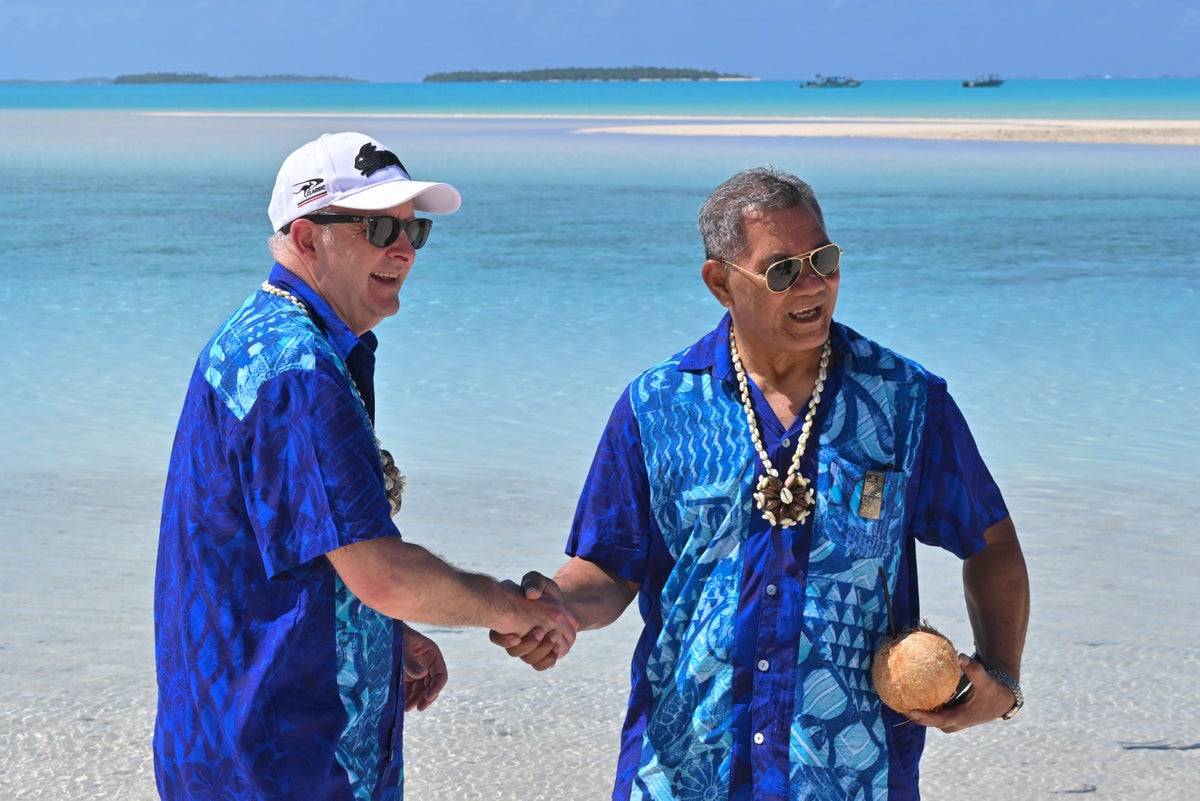
Australia will offer refuge to people affected by the climate crisis in Tuvalu as part of a landmark treaty.
Tuvalu is a country of 11,200 people. The central Pacific country consists of nine low-lying islands that are situated approximately midway between Australia and Hawaii.
It is also one of the nations most severely threatened by the catastrophic impacts of the climate crisis due to rising sea levels.
Australia’s new deal with Tuvalu is part of a broader landmark treaty that will strengthen ties between the two countries and counter China’s influence in the region.
As part of the new deal, Australia will grant new visas to up to 280 people each year, allowing them to live, work and study in Australia.
The prime ministers of Australia and Tuvalu, Anthony Albanese and Kausea Natano, posed for cameras in matching colour shirts while heaping praise on the deal.
Mr Albanese called it a “ground-breaking” agreement, while Mr Natano said the deal was “a beacon of hope”.
The unique climate refuge pact is the first Canberra has offered to foreign nations due to risks posed by the climate crisis.
“It will be regarded as a significant day in which Australia acknowledged that we are part of the Pacific family, and with that comes the responsibility to act,” Mr Albanese said on Friday.
Australian Prime Minister Anthony Albanese and Tuvalu Prime Minister Kausea Natano display a compact between the two nations at the Pacific Resort, Rarotonga, the Cook Island— (EPA)
Mr Natano said it is “not just a milestone but a giant leap forward in our joint mission to ensure regional stability, sustainability and prosperity”.
He said the migration deal would be designed in a way it does not promote brain drain in the Pacific nation.
“The dedication of Australia to supporting the people of Tuvalu goes beyond words and it has touched our hearts profoundly,” Mr Natano said.
The deal is called the Falepili Union – a term in the Tuvaluan language referring to good neighbourliness, care and mutual respect.
The agreement provides a security guarantee to the nation to also respond to security challenges and major natural disasters.
Pacific leaders pose for a group photograph on One Foot Island after attending the Leaders' Retreat— (AP)
Mr Albanese said it gives “a guarantee that upon a request from Tuvalu for any military assistance based upon security issues, Australia will be there”.
Under the treaty, “both countries commit to mutually agree any partnership, arrangement or engagement with any other state or entity on security and defence related matters in Tuvalu,” he said in a press conference in the Cook Islands.
In exchange for security assurance, Tuvalu will need to engage in mutual agreement with Australia before entering into any security and defence-related arrangements with other nations.
An Australian government official said this requirement covered any defence, police, port, telecommunications, energy or cyber security arrangements by Tuvalu.
Tuvalu is one of just 13 nations to maintain an official diplomatic relationship with Taiwan, as Beijing has made increasing inroads into the Pacific.
The deal comes as a major diplomatic win for Canberra at a time China has pursued closer ties in the Pacific, and Taiwan has raised concerns over Beijing luring away its diplomatic partners.
China signed a security pact with the Solomon Islands last year, raising concerns among the South Pacific island’s traditional partners Australia, New Zealand and the US.







